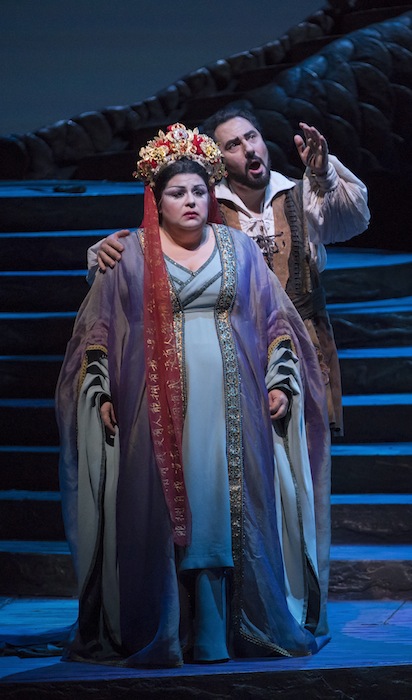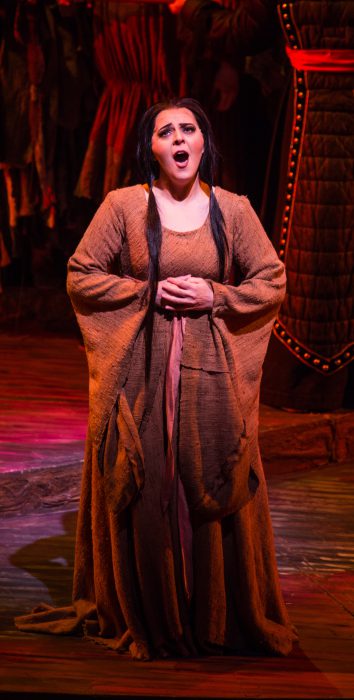La Colla, Wagner and chorus pack a Puccini punch in Lyric Opera’s “Turandot”

In 1926 after the first rehearsal of Franco Alfano’s completed final scene for Giacomo Puccini’s Turandot, Alfano asked Arturo Toscanini, who commissioned his work, “What do you think, Maestro?
The conductor’s reply: “I think I see the ghost of Puccini coming to hit me.”
History has been as unkind to Alfano’s stitchwork as Toscanini–unfairly to some extent. Alfano–a successful composer in his own right–did the best he could with Puccini’s sketches and notes for the closing duet of his swan song, left unfinished at the composer’s death. And, in fairness, the final scene of Puccini’s last opera remains one of the most improbable scenes in an improbable art form, as the man-hating Chinese ice princess is immediately melted into loving humanity with a single kiss from the besotted Calaf who successfully answered three riddles to win her hand.
That famously problematic finale came off as well as can be expected—-no outbursts of audience mirth–in Lyric Opera’s opening performance of Puccini’s Turandot Tuesday night. And while there were some shaky elements in the production, two big-voiced principals along with the Lyric Opera Chorus delivered enough vocal firepower to smooth over the evening’s rough edges.
The role of Turandot is one of the most infamous voice-shredders in the repertory and Amber Wagner largely rose to its daunting challenges in only her second turn at the role. If her cautious tempo for “In questa reggia” threatened to sag the vocal line, Wagner threw out thrilling and powerful top notes in her Act 2 showpiece, and blended gratefully with tenor Stefano La Colla in the final duet.
Dramatically, Wagner’s performance seemed more of a work in progress, even in a role that consists of standing around in an imperious manner for much of the evening. She managed the transition from murderous royal to yielding lover better than most. Yet for a singer as substantial of body as voice, her physical movements seem limited and it’s hard not to feel that Wagner’s size has a deleterious effect on her acting options.
As the suitor Calaf, Stefano La Colla showed he is the real thing in his American opera debut. The singer possesses a lyric tenor with Italianate squillo, ping at the top and ample power in reserve, which at times recalls the young Luciano Pavarotti. La Colla is also a solid actor and sang with imposing strength and flexibility in what has become his signature role.
While it’s gratifying to hear any tenor tackle “Nessun dorma” with this kind of gleam and muscle, La Colla sounded marginally cautious in Calaf’s showpiece aria opening night–odd when his singing was so fearless elsewhere. Still, this was an impressive Chicago debut by any standard; when La Colla and Wagner cut loose together, the effect was electrifying, with two huge voices sailing over the vast orchestra.
As the gentle, doomed slave girl Liù who secretly loves Calaf, Maria Agresta was also making her Lyric Opera bow. Though the Italian soprano has sung this role at the Met and elsewhere, her dark, mezzo-ish timbre sounded miscast and somewhat unfocused in “Signore, ascolta!” unaided by her overdone beseeching gestures. Agresta’s performance became more convincing as the evening wore on, bringing greater vocal radiance to the role and proving dramatically affecting in Liù’s final scene.
In his second Lyric role this fall, Andrea Silvestrelli proved more successful in the role of Timur than any of his recent previous appearances. The towering bass’s big, hoary voice is well-suited to the role of Calaf’s aged father and Silvestrelli was genuinely touching in the old man’s distress at Liù’s death.
The commedia dell’arte trio of Ping, Pang and Pong provided just the right amount of light humor and contrast in what is for the most part, a pretty grim opera. Keith Jameson (Pong) and Rodell Rosel (Pang) are two of our finest character tenors and sang with nimble articulation and personality without going over the top. Zachary Nelson sounded less well-suited to his part, his burly baritone lacking the requisite agility, though he brought a nice nostalgic touch to Ping’s longing for his peaceful home away from Peking.
Bass Patrick Guetti was a strong-voiced Mandarin, tenor Josh Lovell, a youthful-sounding Emperor. Both are current Ryan Opera Center members.
I reviewed this Allen Charles Klein Turandot production 13 years ago at Florida Grand Opera when working as a music critic at South Florida newspapers. It was hardly new then but Klein’s unit set with its golden dragon head and tail, luminous globe and rising platform circles looked more striking and colorful in 2004 on the gray, mundane stage of Miami-Dade County Auditorium. Now 35 years old–and with a lot of road miles since then–the scenery is decidedly worn and tarnished. Designed for a wide, low stage, the set looks threadbare at the top, cheap and undeniably cheesy in Lyric’s high-proscenium space. I realize an opera company has to save money where it can but is importing ill-fitting, ancient productions from Miami that debuted in the second year of the Reagan administration the answer? Call it the regionalization of Lyric Opera.
At least the tired sets and costumes served the piece, which wasn’t always the case with the on-and-off stage direction of Rob Kearley. Making his Lyric Opera debut, David Pountney’s assistant moved the massed chorus and extras capably apart from some static moments and line-up-at-the-footlights cliches in Act 1. Having Liu’s dead body remain onstage for the entire final scene of the opera was a bizarre and distracting conceit.
Unfortunately, the evening began on a disastrous staging note with Liù singing “My master has fallen!” several seconds before Silvestrelli’s Timur got to the front of the stage and abruptly and unmotivatedly fell at her feet.
Amazingly, the exact same lapse happened in Act III, when the soldiers’ cry “Here is the man, we have found them” and Calaf responds, “These two know nothing!” several beats before the captured Liù and Timur are brought on stage. I don’t know whose boyfriend or nephew was hired as assistant director but this is the kind of jarring amateurism one expects at a high school pageant not from a major opera house. Get it together, guys.
Andrew Davis is one of the most versatile opera conductors of our day, wholly convincing in repertoire ranging from Mozart to Britten, and Wagner to Berg. Yet I’m not sure that Puccini is a fit for Lyric’s music director. Davis’s conducting of the Lyric Opera Orchestra was solid and sensitive yet missing a certain idiomatic Puccini flavor and warmth in the long lines and surging melodies. There were also some uncharacteristic moments of miscoordination between the singers and the pit.
Ultimately, in this grandest of Puccini operas, the evening really belonged to the magnificent Lyric Opera Chorus. With its numerous crowd scenes and majestic ensembles, Michael Black’s singers commanded the stage, bringing jarring intensity to the cries of the bloodthirsty Peking mobs as well as glowing delicacy to the more ethereal choruses.
Turandot runs through January 27, 2018. Janai Brugger sings the role of Liù in the January performances. lyricopera.org
Posted in Performances


